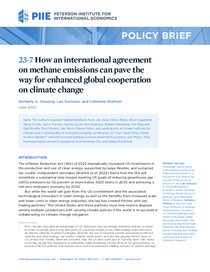How an international agreement on methane emissions can pave the way for enhanced global cooperation on climate change

Clausing, Kimberly ; Garicano, Luis ; Wolfram, Catherine D.
Peter G. Peterson Institute for International Economics, Washington, DC
Peterson Institute - Washington, DC
2023
21 p.
climate change ; international agreement ; gas emission ; environmental policy
Policy Brief
23-7
Law
https://www.piie.com/sites/default/files/2023-06/pb23-7.pdf
English
Bibliogr.
"Under the 2022 Inflation Reduction Act, the United States has for the first time implemented a methane emissions fee as a backstop to new methane regulations in the oil and gas sectors. The European Union is also implementing methane regulations on fossil energy. Methane is a short-lived but potent greenhouse gas, and reducing it is imperative for limiting global temperature rise to the 1.5°C target. Among the primary sources of methane emissions (including agriculture, fossil fuels, and waste), the oil and gas sectors have the greatest low-cost abatement potential. Clausing and colleagues recommend that the United States and the European Union coordinate their methane reduction policies and eventually impose border adjustments on imports from countries that fail to raise their standards. The aim would be to encourage oil and gas exporters to adopt comparable regulations or, if they fail to do so, pay a border adjustment fee on exports to the two jurisdictions. A US-EU methane border adjustment policy in oil and gas would reduce methane emissions by an estimated 15 to 45 percent worldwide, while having an indiscernible effect on key energy prices US and EU households face. With time, most major energy importers would ideally join the coalition of countries cooperating on both stringent domestic regulations on oil and gas production and border adjustments on any dirty, nonregulating exporters. Such an international agreement would help defuse frictions caused by differing climate policies and increase incentives for ambitious climate policy action worldwide."
Digital
The ETUI is co-funded by the European Union. Views and opinions expressed are however those of the author(s) only and do not necessarily reflect those of the European Union or the ETUI.